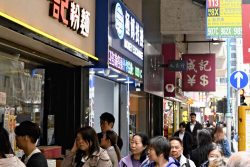13:05 JST, December 3, 2020
Testing of athletes at four- or five-day intervals in the athletes’ village was among the interim list of concrete measures compiled by a government task force that met Wednesday at the Prime Minister’s Office to address preventing the spread of the novel coronavirus at the Tokyo Olympics and Paralympics
Still, many issues remain unresolved, and the government is rushing to come up with workable and effective options.
The interim report calls for athletes from countries or regions that are subject to denial of entry to be allowed to enter the country, but under the condition that they are tested for the virus upon arrival, and then retested four or five days later.
All athletes will be exempt from the 14-day isolation period after arriving in Japan, but will be tested upon entering the athletes’ village and every four to five days thereafter in an effort to quickly identify infected people. Japanese athletes living in Japan will be subject to the same testing protocols while staying in the village.
Specific countermeasures will be determined for each competition. Taking into account results from pre-Games test events, all protocols will be decided by June next year.
One important issue still unresolved is, if an athlete is found to be infected, how to proceed with the operation of events in terms of whether or not others who came into close contact with the infected person will be allowed to compete.
With regard to spectators coming from abroad, a decision will be made by next spring addressing the easing of the 14-day post-entry isolation period and the request to refrain from using public transportation.
In more detail, the government will consider confirming test results before the person comes to Japan, and using a health management app to monitor visitor movements. Depending on the infection situation in the individual’s country, the response may include maintaining the 14-day isolation period.
The maximum number of spectators allowed in venues will be in line with current regulations set for domestic sports and events, and will be decided by next spring.
In addition, the government will continue to devise measures to avoid congestion at events and competitions held on public roads, such as the torch relay, marathons and race walks, as well as to secure hospital beds or accommodations for infected people.
Top Articles in Society
-

Man Infected with Measles May Have Come in Contact with Many People in Tokyo, Went to Store, Restaurant Around When Symptoms Emerged
-

Australian Woman Dies After Mishap on Ski Lift in Nagano Prefecture
-

Woman with Measles Visited Hospital in Tokyo Multiple Times Before Being Diagnosed with Disease
-

Foreign Snowboarder in Serious Condition After Hanging in Midair from Chairlift in Nagano Prefecture
-

Record-Breaking Snow Cripples Public Transport in Hokkaido; 7,000 People Stay Overnight at New Chitose Airport
JN ACCESS RANKING
-

Japan Institute to Use Domestic Commercial Optical Lattice Clock to Set Japan Standard Time
-

Israeli Ambassador to Japan Speaks about Japan’s Role in the Reconstruction of Gaza
-

Man Infected with Measles May Have Come in Contact with Many People in Tokyo, Went to Store, Restaurant Around When Symptoms Emerged
-

China Eyes Rare Earth Foothold in Malaysia to Maintain Dominance, Counter Japan, U.S.
-

Prudential Life Insurance Plans to Fully Compensate for Damages Caused by Fraudulent Actions Without Waiting for Third-Party Committee Review






















